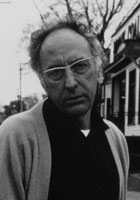William Bronk
William Bronk Poems
Whether what we sense of this world
is the what of this world only, or the what
of which of several possible worlds
- which what?- something of what we sense
...
This boy, of course, was dead, whatever that
might mean. And nobly dead. I think we should feel
he was nobly dead. He fell in battle, perhaps,
...
What we are? We say we want to become
what we are or what we have an intent to be.
We read the possibilities, or try.
...
William Bronk Biography
William Bronk (February 17, 1918 - February 22, 1999) was an American poet. For the 1981 collection Life Supports he won the National Book Award for Poetry. William Bronk was born in a house on Lower Main Street in Fort Edward, New York. He had an older brother, Sherman, who died young and two older sisters, Jane and Betty. William attended Dartmouth College, arriving there at the age of 16, and after graduation spent one semester at Harvard. Bronk served in World War II first as a draftee but later, after attending OCS, as an officer. He was discharged from the Army in October 1945 and started teaching English at Union College, Schenectady, New York. He left Union in June 1946 and returned to Hudson Falls. There, during the later half of 1946, he completed work on The Brother in Elysium. In January 1947 Bronk took over management of the Bronk Coal and Lumber Company which he had inherited when his father died unexpectedly in 1941. After his one semester of graduate school at Harvard, Bronk “decided I couldn't take any more of that.” He taught English at Union College. After his father died in 1941, he decided to return to the family business temporarily. He ended up staying more than 30 years. He retired from the business in 1978. Bronk said that the poems were created in his mind as he went through the business of the day. When one was ready, he put it on paper, working in longhand rather than at a typewriter. As his manuscripts attest, he seldom rewrote, or even modified, a poem once written on paper. William Bronk died Sunday, February 22, 1999.)
The Best Poem Of William Bronk
Metonymy As An Approach To A Real World
Whether what we sense of this world
is the what of this world only, or the what
of which of several possible worlds
- which what?- something of what we sense
may be true, may be the world, what it is, what we sense.
For the rest, a truce is possible, the tolerance
of travelers, eating foreign foods, trying words
that twist the tongue, to feel that time and place,
not thinking that this is the real world.
Conceded, that all the clocks tell local time;
conceded, that 'here' is anywhere we bound
and fill a space; conceded, we make a world:
is something caught there, contained there,
something real, something which we can sense?
Once in a city blocked and filled, I saw
the light lie in the deep chasm of a street,
palpable and blue, as though it had drifted in
from say, the sea, a purity of space.
William Bronk Comments
In a letter, Bill Bronk once told me that in writing poems we are just Two guys talking. That impressed me. As a result, like him, my poems tend to be conversational, dialogical, soliciting readers to respond to them.
Bill Bronk was a friend and mentor to me. His poetry enlarges our understanding of what we know and don't know about the world we live in.
William Bronk was a friend and mentor to me. In a letter he once wrote that in writing poems we are just Two guys talking. That is how he approached the writing of poems: wanting to communicate with his readers, the easiest way being in a conversation style. Nonetheless, how profound his poems are book after book. Few of his poems appear here on Poet Hunter, which is a shame as Bill's corpus nlarges our understanding of what we know and don't know of this world. in which we live.

The dearth of William Bronk poems available here is surprising. I registered here so as to upload some, but unfortunately that option is hard to find or just unavailable.